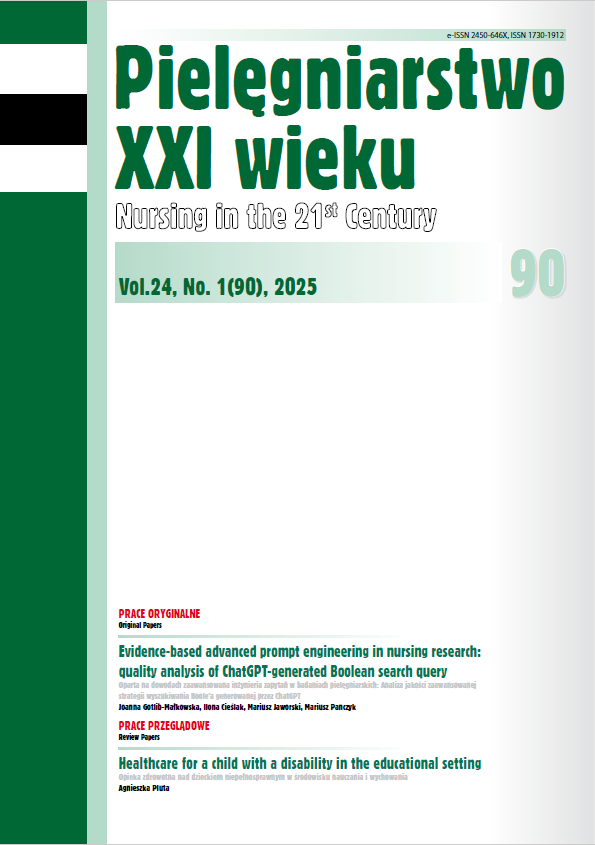Selected aspects of parenthood in the perception of men – Part II
DOI:
https://doi.org/10.12923/pielxxiw-2025-0001Keywords:
attitudes, men, childbirthAbstract
SELECTED ASPECTS OF PARENTHOOD IN THE PERCEPTION OF MEN – PART II
Aim. To investigate the attitudes of men who plan to become fathers or not, and who either participate in antenatal classes regarding the birth or not.
Material and methods. The study included three groups of 200 men each: I - those who do not plan to become fathers, II - who will be fathers and have not attended antenatal classes, III - who will be fathers and have attended antenatal classes. A self-authored questionnaire was used.
Results. Only 34.5% of respondents participated in the previous birth. The feelings before childbirth were dominated by fear of seeing blood, helplessness in the face of the woman’s suffering and fear. The best place to give birth is a hospital, and the best way to participate in the act of giving birth is to hold the hand of the woman giving birth (36.1%).
Conclusions. The willingness to participate in childbirth was influenced by participation in childbirth classes, and not by the duration of marriage, having children, age, place of residence, or education. Demographic variables did not influence men’s perception of the benefits of shared birth. Only education was a factor having influence on the belief that giving birth together reduces fear, loneliness and brings spouses closer.
References
1. Bejda G, Kułak-Bejda A. Depression - is it also a problem for men? Prog. Health Sci. 2022; 12(2): 90-98. https://doi.org/10.5604/01.3001.0016.1752.
2. Goodman JH. Paternal postpartum depression, its relationship to maternal postpartum depression, and implications for family health. J. Adv. Nurs. 2004; 45(1): 26-35. https://doi.org/10.1046/j.1365-2648.2003.02857.x.
3. De Vries R, Nieuwenhuijze M, Buitendijk SE, et al. What does it take to have a strong and independent profession of midwifery? Lessons from the Netherlands. Midwifery. 2013;29(10):1122-1128. https://doi.org/10.1016/j.midw.2013.07.007.
4. Bahl R, Strachan B, Murphy DJ. Outcome of subsequent pregnancy three years after previous operative delivery in the second stage of labour: cohort study. BMJ. 2004;328(7435):311. https://doi.org/10.1136/bmj.37942.546076.44.
5. Grignaffini A, Soncini E, Ricco R, et al. Corsi di preparazione al parto: valutazioni ostetriche e alla nascita [Childbirth preparation courses: obstetrical and neonatal evaluation]. Acta Biomed Ateneo Parmense. 2000;71 Suppl 1:701-707. Italian.
6. Soderquist J, Wijma K, Wijma B. Traumatic stress in late pregnancy. J. Anxiety Disord, 2004;18(2):127-142. https://doi.org/10.1016/S0887-6185(02)00242-6.
7. Lundgren I, Berg M, Lindmark G. Is the childbirth experience improved by a birth plan? J. Midwifery Women’s Health. 2003;48(5):322-328. https://doi.org/10.1016/s1526-9523(03)00278-2.
8. Ulman-Włodarz I, Poręba A, Kwiatkowska E, et al. Poród z udziałem ojca – wpływ na kształtowanie więzi w rodzinie Klin. Perinatol. Ginekol. 2007;43:52-56.
9. Zimmermann-Tansella C, Dolcetta G, Azzini V, et al. Preparation courses for childbirth in primipara. A comparison. J. Psychosom. Res. 1979;23:227-233.
10. Hershkovitz-Freudenthal A, Lavenda O. Factors associated with contemporary father-hood. Front. Psychol.2024;15:1403955. https://doi.org/10.3389/fpsyg.2024. 1403955. eCollection 2024.
11. Dubras L. The birth of the School of Medicine at Ulster University. Ulster Med. J. 2021;90(3):135-137.
12. Fijałkowski W. Ku afirmacji życia. Lublin; Wyd. Gaudium, 2003.
13. Stewart DE, Vigod SN. Postpartum Depression: Pathophysiology, Treatment, and Emerging Therapeutics. Annu. Rev. Med. 2019;70:183-196. https://doi.org/10.1146/annurev-med-041217-011106.
14. Walsh TB, Carpenter E, Costanzo MA, et al. Present as a partner and a parent: Mothers’ and fathers’ perspectives on father participation in prenatal care. Infant Ment. Health J. 2021;42(3):386-399. https:// doi.org/ 10.1002/imhj.21920.
15. Corno G, Espinoza M, Maria Baños RA. narrative review of positive psychology interventions for women during the perinatal period. J. Obstet. Gynaecol. 2019;39(7):889-895. https://doi.org/10.1080/01443615.2019.1581735.
16. Parkinson KN, Reilly JJ, Basterfield L, et al. Mothers’ perceptions of child weight status and the subsequent weight gain of their children: a population-based longitudinal study. Int. J. Obes (Lond). 2017;41(5):801-806. https://doi.org/10.1038/ijo.2017.20.
17. Simonelli A, Parolin M, Sacchi C, et al. The Role of Father Involvement and Marital Satisfaction in the Development of Family Interactive Abilities: A Multilevel Approach. Front. Psychol. 2016;7:1725. https://doi.org/10.3389/fpsyg.2016.01725.
18. Kornas-Biela D. Najmłodsze dziecko w rodzinie [w]: Rodzina. Myśli i działanie. Soszyńska G. (red.). Lublin: Wyd. Polihymnia; 2004, s. 52.
19. Formański J. Charakterystyka rozwoju człowieka w poszczególnych okresach życia. [w:] Psychologia. Warszawa: PZWL; 2003, p. 300-302.
20. Alderdice F. Enduring questions in perinatal psychology. J. Reprod. Infant Psychol. 2018;36(5):461-462. https://doi.org/10.1080/02646838.2018.1539440.
21. He HG, Vehviläinen-Julkunen K, Qian XF, et al. Fathers’ feelings related to their partners’ childbirth and views on their presence during labour and childbirth: A descriptive quantitative study. Int. J. Nurs. Pract. 2015; 21 Suppl 2:71-79. https://doi.org/10.1111/ijn.12339.
22. Dai J, Shi Y, Guo L, et al. Discrepancy in parental fear of childbirth: A scoping review. Midwifery. 2023;126:103830. https://doi.org/10.1016/j.midw.2023.103830.
23. McNab E, Hollins Martin CJ, Norris G. Factors that influence father’s experiences of childbirth and their implications upon postnatal mental health: A narrative systematic review. Nurse Educ Pract. 2022 Nov;65:103460. doi: 10.1016/j.nepr.2022.103460
24. Xue WL, Shorey S, Wang W, et al. Fathers’ involvement during pregnancy and childbirth: An integrative literature review. Midwifery. 2018; 62:135-145. https://doi.org/10.1016/j.midw.2018.04.013.
25. Berkau A, Suchowiak S, Plagens-Rotman K. Poród rodzinny z perspektywy ojca dziecka. Pol. Prz. Nauk Zdr. 2016; 1(46): 18-23.
26. Kmita G, Kiepura E, Majos A. Paternal Involvement and Attention Sharing in Interactions of Premature and Full-Term Infants with Fathers: A Brief Report. Psychol. Lang. Commun. 2014;18(3):190-203. https://doi.org/10.2478/plc-2014-0019.
27. Wdowiak A, Bakalczuk G, Dadej E, et al. Birthing school – patient’s assessment on the influence of classes on parturition. Pielegniarstwo XXI wieku 2016;15(3): 17-22. https://doi.org/10.1515/pielxxiw-2016-0023.
Downloads
Published
Issue
Section
License
Copyright (c) 2025 Authors

This work is licensed under a Creative Commons Attribution 4.0 International License.




